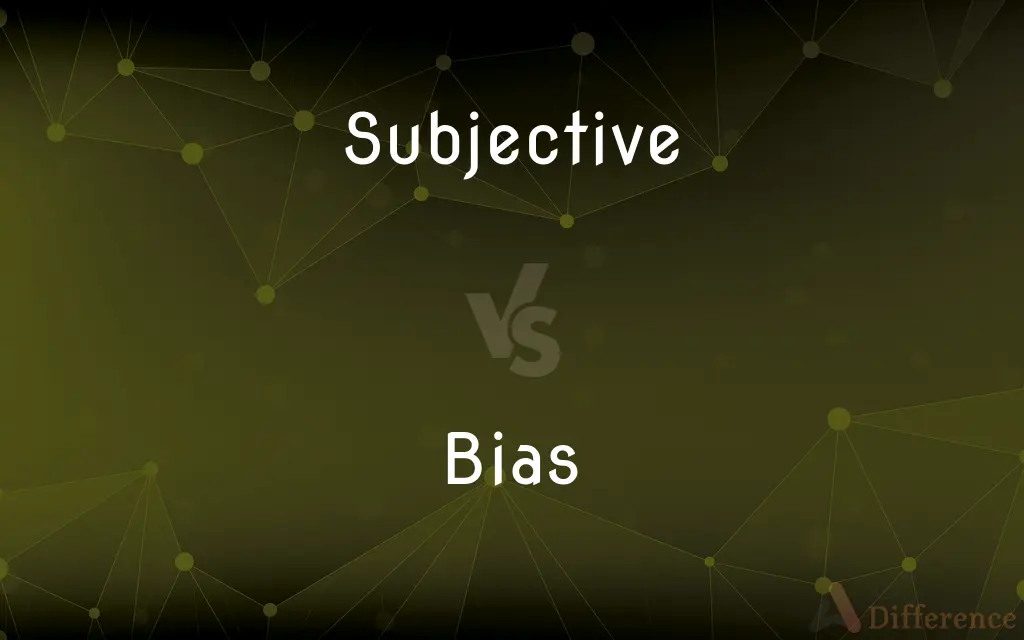Subjective vs. Bias — What's the Difference?
By Tayyaba Rehman & Maham Liaqat — Updated on April 9, 2024
Subjective views are based on personal opinions or feelings, focusing on individual perspectives. Bias, however, implies a prejudice that skews viewpoints, often unfairly favoring one side.

Difference Between Subjective and Bias
Table of Contents
ADVERTISEMENT
Key Differences
Subjective viewpoints stem from personal experiences, emotions, and perceptions, highlighting the individual's unique perspective on issues or events. These views are inherently personal and can vary widely from person to person. Whereas bias refers to an inclination or prejudice for or against one person, group, or thing in a way that is considered unfair. It often results from preconceived notions, whether conscious or unconscious, affecting neutrality.
In subjective analysis, the emphasis is on personal interpretation and meaning, allowing for a diversity of opinions and perspectives. This type of analysis acknowledges the complexity of human experience and the impossibility of complete objectivity in certain areas. On the other hand, bias suggests a deviation from impartiality, where the individual’s preferences, experiences, or prejudices unduly influence their perspective, often leading to partial or distorted conclusions.
Subjectivity can enrich discussions, offering multiple angles and insights on a topic. It fosters an environment where varied interpretations are recognized and valued. However, bias, particularly when unrecognized, can limit understanding and hinder the exploration of different viewpoints, potentially leading to miscommunication and conflict.
While subjective views can be openly acknowledged by individuals as being based on personal preferences, biases are often more insidious and may not be as readily admitted or even recognized by the individual. This distinction is crucial in discussions and analyses, where acknowledging subjectivity can be a strength, but unrecognized biases can undermine credibility.
Subjectivity allows for flexibility and adaptability in thought, reflecting the fluid nature of human experiences and perceptions. Bias, however, tends to be more rigid, potentially restricting open-mindedness and the ability to consider alternative viewpoints or evidence that contradicts pre-existing beliefs.
ADVERTISEMENT
Comparison Chart
Definition
Based on personal feelings, tastes, or opinions.
A prejudice in favor or against something, often in a way considered to be unfair.
Basis
Personal experiences, emotions, and perceptions.
Preconceived notions, whether conscious or unconscious.
Role in Analysis
Provides personal interpretation and meaning.
Can lead to partial or distorted conclusions.
Impact on Discussions
Enriches by offering multiple perspectives.
May limit understanding and hinder exploration of viewpoints.
Recognition and Admission
Often openly acknowledged as personal perspective.
May not be readily admitted or even recognized.
Compare with Definitions
Subjective
Variable between individuals.
Subjective experiences of the concert varied from person to person.
Bias
Distortion of perspective based on preconceived notions.
The study's results were questioned due to the researchers' obvious bias.
Subjective
Based on feelings rather than facts.
Their decision to buy the house was somewhat subjective, influenced by its charm.
Bias
Unfairly prejudiced for or against someone or something.
His decisions were often influenced by his personal biases.
Subjective
Reflecting personal bias or preferences.
He admitted his review was subjective, influenced by his personal interests.
Bias
Prejudice in favor of or against one thing or group.
The teacher’s bias towards students from her hometown was evident.
Subjective
Pertaining to personal views or experiences.
His subjective opinion on the movie was based on his love for science fiction.
Bias
A tendency to lean in a certain direction, either in favor of or against something.
There was a noticeable bias in the news report against the proposed law.
Subjective
Influenced by individual tastes.
Her critique of the painting was highly subjective.
Bias
An inclination that affects judgment.
Her bias against modern art made her a tough critic of contemporary exhibits.
Subjective
Dependent on or taking place in a person's mind rather than the external world
"The sensation of pain is a highly subjective experience that varies by culture as well as by individual temperament and situation" (John Hoberman).
Bias
Bias is a disproportionate weight in favor of or against an idea or thing, usually in a way that is closed-minded, prejudicial, or unfair. Biases can be innate or learned.
Subjective
Based on a given person's experience, understanding, and feelings; personal or individual
Admitted he was making a highly subjective judgment.
Bias
A line going diagonally across the grain of fabric
Cut the cloth on the bias.
Subjective
(Psychology) Not caused by external stimuli.
Bias
A preference or an inclination, especially one that inhibits impartial judgment.
Subjective
(Medicine) Of, relating to, or designating a symptom or complaint perceived by a patient.
Bias
An unfair act or policy stemming from prejudice.
Subjective
Expressing or bringing into prominence the individuality of the artist or author.
Bias
A statistical sampling or testing error caused by systematically favoring some outcomes over others.
Subjective
(Grammar) Relating to or being the nominative case.
Bias
A weight or irregularity in a ball that causes it to swerve, as in lawn bowling.
Subjective
Relating to the real nature of something; essential.
Bias
The tendency of such a ball to swerve.
Subjective
Formed, as in opinions, based upon a person's feelings or intuition, not upon observation or reasoning; coming more from within the observer than from observations of the external environment.
Bias
The fixed voltage applied to an electrode.
Subjective
Pertaining to subjects as opposed to objects (A subject is one who perceives or is aware; an object is the thing perceived or the thing that the subject is aware of.)
Bias
Slanting or diagonal; oblique
A bias fold.
Subjective
Resulting from or pertaining to personal mindsets or experience, arising from perceptive mental conditions within the brain and not necessarily or directly from external stimuli.
Bias
To influence in a particular, typically unfair direction.
Subjective
Lacking in reality or substance.
Bias
To apply a small voltage to (a grid).
Subjective
As used by Carl Jung, the innate worldview orientation of the introverted personality types.
Bias
Inclination towards something.
Subjective
Experienced by a person mentally and not directly verifiable by others.
Bias
The diagonal line between warp and weft in a woven fabric.
Subjective
Describing conjugation of a verb that indicates only the subject (agent), not indicating the object (patient) of the action. In linguistic descriptions of Tundra Nenets, among others.
Bias
A wedge-shaped piece of cloth taken out of a garment (such as the waist of a dress) to diminish its circumference.
Subjective
Of or pertaining to a subject.
Bias
(electronics) A voltage or current applied to an electronic device, such as a transistor electrode, to move its operating point to a desired part of its transfer function.
Subjective
Especially, pertaining to, or derived from, one's own consciousness, in distinction from external observation; ralating to the mind, or intellectual world, in distinction from the outward or material excessively occupied with, or brooding over, one's own internal states.
Bias
(statistics) The difference between the expectation of the sample estimator and the true population value, which reduces the representativeness of the estimator by systematically distorting it.
Subjective
Modified by, or making prominent, the individuality of a writer or an artist; as, a subjective drama or painting; a subjective writer.
Bias
(sports) In the games of crown green bowls and lawn bowls: a weight added to one side of a bowl so that as it rolls, it will follow a curved rather than a straight path; the oblique line followed by such a bowl; the lopsided shape or structure of such a bowl. In lawn bowls, the curved course is caused only by the shape of the bowl. The use of weights is prohibited.
Subjective
Taking place within the mind and modified by individual bias;
A subjective judgment
Bias
(South Korean idol fandom) A person's favourite member of a K-pop band.
Subjective
Of a mental act performed entirely within the mind;
A cognition is an immanent act of mind
Bias
(transitive) To place bias upon; to influence.
Our prejudices bias our views.
Bias
(electronics) To give a bias to.
Bias
Inclined to one side; swelled on one side.
Bias
Cut slanting or diagonally, as cloth.
Bias
In a slanting manner; crosswise; obliquely; diagonally.
To cut cloth bias
Bias
A weight on the side of the ball used in the game of bowls, or a tendency imparted to the ball, which turns it from a straight line.
Being ignorant that there is a concealed bias within the spheroid, which will . . . swerve away.
Bias
A leaning of the mind; propensity or prepossession toward an object or view, not leaving the mind indifferent; bent; inclination.
Strong love is a bias upon the thoughts.
Morality influences men's lives, and gives a bias to all their actions.
Bias
A wedge-shaped piece of cloth taken out of a garment (as the waist of a dress) to diminish its circumference.
Bias
A slant; a diagonal; as, to cut cloth on the bias.
Bias
Inclined to one side; swelled on one side.
Bias
Cut slanting or diagonally, as cloth.
Bias
In a slanting manner; crosswise; obliquely; diagonally; as, to cut cloth bias.
Bias
To incline to one side; to give a particular direction to; to influence; to prejudice; to prepossess.
Me it had not biased in the one direction, nor should it have biased any just critic in the counter direction.
Bias
A partiality that prevents objective consideration of an issue or situation
Bias
A line or cut across a fabric that is not at right angles to a side of the fabric
Bias
Influence in an unfair way;
You are biasing my choice by telling me yours
Bias
Cause to be biased
Bias
Slanting diagonally across the grain of a fabric;
A bias fold
Common Curiosities
What is subjectivity?
Subjectivity refers to viewpoints or analyses based on personal feelings, tastes, or opinions.
How does subjectivity affect analysis?
It introduces personal interpretation and meaning, acknowledging the complexity of human experiences.
What defines bias?
Bias is a prejudice for or against something, often in a manner considered to be unfair.
Is it possible to be completely objective?
True objectivity is challenging due to inherent subjective perceptions and potential biases.
How can one recognize bias in themselves?
Through self-reflection, seeking diverse perspectives, and being aware of one’s preconceptions.
Can bias be positive?
While bias can favor certain viewpoints, it's typically seen as limiting due to its potential to distort understanding.
Why is acknowledging subjectivity important?
It allows for a broader discussion by recognizing and valuing diverse opinions and perspectives.
What role does bias play in media?
Bias can affect how information is presented, potentially influencing public opinion and perceptions.
What impact does bias have on decision-making?
Bias can lead to partial decisions and restrict open-mindedness, potentially affecting outcomes negatively.
Can bias be unconscious?
Yes, biases can be unconscious, influencing thoughts and actions without the individual's awareness.
How can one reduce their own biases?
By actively seeking information from diverse sources and engaging in self-reflection and critical thinking.
How do subjective opinions differ from biased views?
Subjective opinions are based on personal preferences, while biased views are prejudiced and often unfair.
Share Your Discovery

Previous Comparison
Deck vs. Desk
Next Comparison
Chimney vs. SmokestackAuthor Spotlight
Written by
Tayyaba RehmanTayyaba Rehman is a distinguished writer, currently serving as a primary contributor to askdifference.com. As a researcher in semantics and etymology, Tayyaba's passion for the complexity of languages and their distinctions has found a perfect home on the platform. Tayyaba delves into the intricacies of language, distinguishing between commonly confused words and phrases, thereby providing clarity for readers worldwide.
Co-written by
Maham Liaqat













































